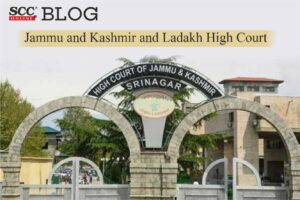Jammu and Kashmir and Ladakh High Court: While deciding the instant petitions, the question that came up before that Court was whether a person can be prosecuted for offence under Section 420 of IPC as also for offence under Section 138 of NI Act, on the same set of facts and whether or not it would amount to double jeopardy. The single Judge Bench of Sanjay Dhar, J., observed that the offences under Section 138, NI act and Section 420, IPC, are two distinct offences, therefore the principle of double jeopardy or rule of estoppel does not come into play.
Relevant Facts of the case: The two clubbed petitions dealt with complaints filed by the respondents under S. 138 of Negotiable Instruments Act, 1881 concerning the sale of a patch of land. In both cases, the petitioners approached the respondents to sell the land and promised to pay damages if the sale did not proceed. In both cases the land could not be cold thereby the respondents became entitled to damages. The petitioners issued cheques drawn on HDFC Bank Branch unit Baghat, Barzulla, bearing the amount that was to be paid as damages; however, the cheques were dishonoured with the endorsement “drawers account closed”.
Contentions: The petitioners submitted before the Court that the respondent, prior to the filing of the complaints under S. 138, NI Act, had filed an FIR for offences under Section 420, 506 IPC, the contents of which are identical to the impugned complaints. The petitioners argued that they cannot be prosecuted twice on the basis of some set of facts as it would amount to double jeopardy. It was also contended that continuance of proceedings in the impugned criminal complaints would be an abuse of process of law and it would amount of forum shopping.
Analysis/ Observations: Perusing the facts and contentions of the matter, the Court referred to Maqbool Hussain v. State of Bombay, 1953 SCR 730, wherein the Constitution Bench of the Supreme Court had dealt with the issue of double jeopardy and held that the fundamental right which is guaranteed under Art. 20(2) of the Constitution enunciates the principle of “double jeopardy” i.e., a person must not be put in peril twice for the same offence. The High Court further referred the case of Sangeetaben Mahendrabhai Patel v. State of Gujarat, (2012) 7 SCC 621.
-
The High Court observed that offences under Section 138 of the NI Act and Section 420 of IPC are distinct from each other because ingredients of the two offences are different. Examining the distinctions in both the offences, the Court pointed out that- in a prosecution under Section 138, fraudulent or dishonest intention at the time of issuance of cheque need not be proved; but in a prosecution under Section 420, fraudulent or dishonest intention is an important ingredient to be established.
-
It was further noted that for an offence under Section 138, NI Act, it has to be established that the cheque has been issued by the accused to discharge a legally enforceable debt or liability and the same has been dishonoured for insufficiency of funds etc. and despite receipt of statutory notice of demand, the accused has failed to pay the amount of cheque within the stipulated time. Whereas in Section 420, IPC, it has to be proved by prosecution that at the very inception i.e., at the time of issuance of the cheque by the accused, he had a dishonest intention.
Decision: With the afore-stated analysis, the Court dismissed the petitions and held that merely because the respondent had lodged an FIR under Section 420, IPC containing allegations relating to the same transaction, which is subject matter of the impugned complaints, it does not make out a case of forum shopping or double jeopardy. The Court further held that the respondents are well within their rights to continue prosecution for both these offences under Section 138 of NI Act and Section 420 of IPC simultaneously.
Upon the question of belated filing of the impugned complaints, the Court held that the impugned complaints have been filed by respondents during the period which is covered by the order of the Supreme Court in Cognizance for Extension of Limitation, In re, (2022) 3 SCC 117.
[Fayaz Ahmad Sheikh v. Mushtaq Ahmad Khan, CRM(M) No.280/2021, decided on 15-07-2022]
Advocates who appeared in this case :
Sheikh Hilal, Advocatefor the Petitioner;
Waseem Shamas, Advocate, for the Respondents.
*Sucheta Sarkar, Editorial Assistant has prepared this brief

